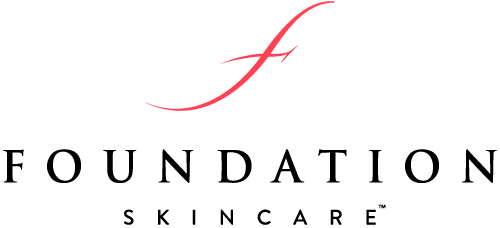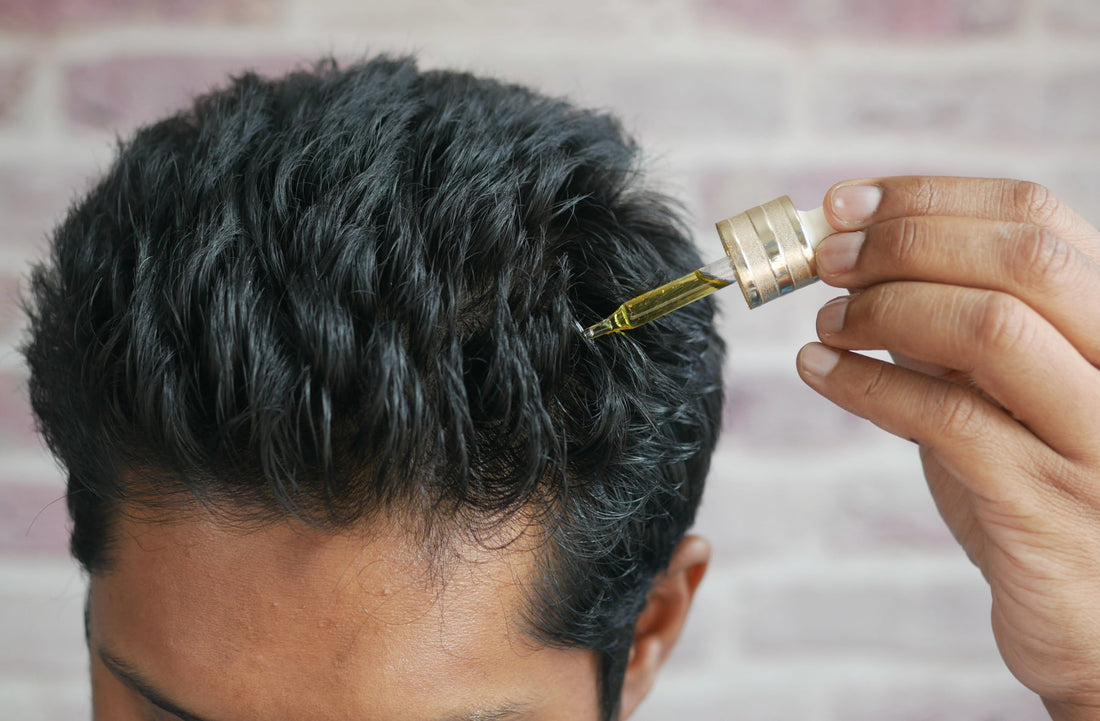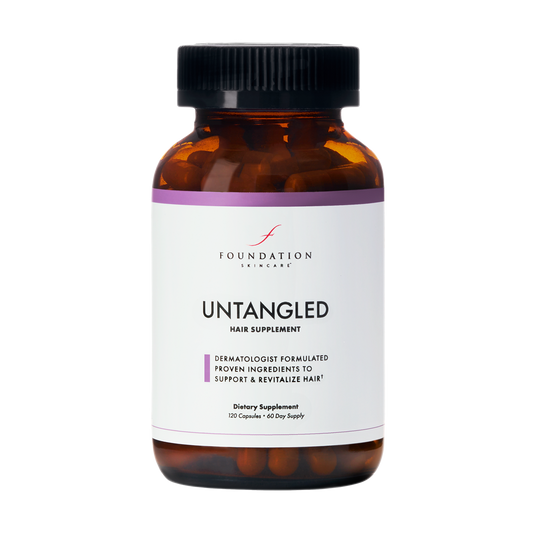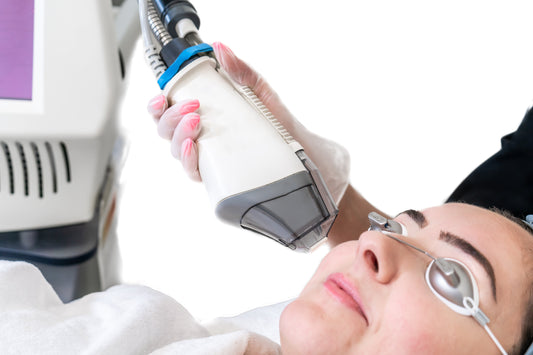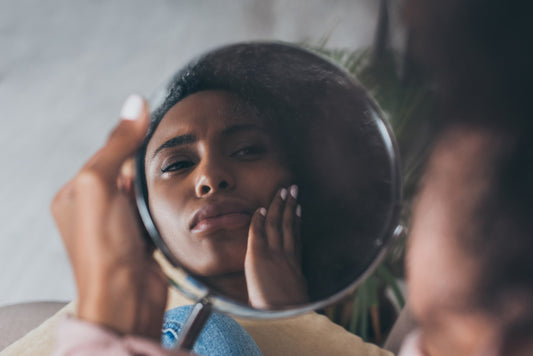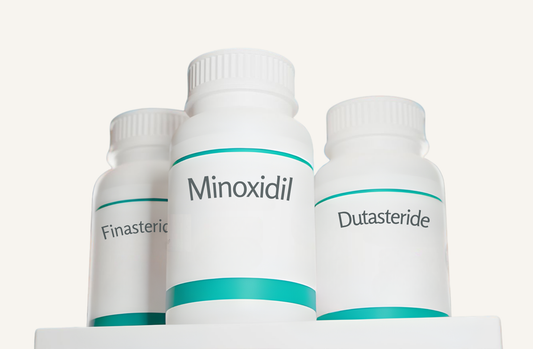If you’re experiencing hair loss, you’ve probably heard of minoxidil, or Rogaine®. It is one of the most well-known topical medications for hair loss, and for some people, it’s a great solution.
However, it is not the only option. Minoxidil has the potential for various side effects and for some people, a non-prescription and gentler product or even oral option will be a better fit. Here, we’ll go over some of the Rogaine/Minoxidil alternatives, including vitamins and minerals, other topical serums, other medications, and lifestyle changes.
First, let’s take a look at what minoxidil is in the first place.
What is Minoxidil?
Minoxidil is a prescription medication that is applied directly to the scalp to stimulate hair growth in both men and women with certain types of baldness. In the U.S., it is also more widely known as Rogaine. According to Cleveland Clinic, experts aren’t entirely sure why this medication works the way it does, but we do seem to know that hair growth will only occur while the medication is being used — and will return to falling out after you stop using the medication.1
Other possible side effects of minoxidil include itching or rash, burning of scalp, hair growth on the face, facial swelling, or potentially increased hair loss. Less common, more serious side effects can occur if too much of the medication is absorbed into the skin, like blurred vision, chest pain, dizziness, fainting, flushing, irregular heart beat, or rapid weight gain.1
Vitamins & Minerals
With the potential for side effects in mind, it’s important to note that minoxidil is a strong prescription medication and should only be used under a doctor’s supervision. If you’re looking for some Rogaine/Minoxidil alternatives that are a bit less risky, we’d recommend starting with vitamins and minerals that are proven to help.
According to Harvard Health, the following vitamins and minerals have been shown to improve hair health2:
- vitamin A
- vitamin B2 (riboflavin)
- vitamin B3 (niacin)
- vitamin B7 (biotin)
- vitamin B9 (folate)
- vitamin B12
- vitamin C
- vitamin D
- vitamin E
- iron
- selenium
- zinc
Other research has shown that ingredients like saw palmetto powder, horsetail powder, collagen, Pantothenic Acid, and essential amino acids like L-Arginine, L-Cysteine, L-Methionine, and L-Tyrosine are also useful in boosting hair growth.2,3,4,5,6
Many of these vitamins and minerals you can get from food. For instance, vitamin C is abundant in berries, citrus fruits, and certain vegetables; B vitamins are in meats, dairy products, grains, and various vegetables.7 However, it can be hard to get all of the vitamins you need, in the dosage that is optimal — and nearly impossible to get things like saw palmetto and horsetail powder — from diet alone.
This is where supplements can come in handy. Foundation Skincare’s UnTangled supplement is carefully formulated with precise amounts of each ingredient and is proven to boost hair growth in a two-capsule per day dosage. Unlike medications like minoxidil, it will not cause any initial shedding and has no serious side effects.
UnTangled Hair Supplement
• Reduces shedding & thinning
• Strengthens hair follicles
Sale price
$65
Topical Treatments & Serums
As we mentioned, minoxidil is a prescription topical treatment for hair loss, and often, Rogaine/Minoxidil is the first name that comes to mind in terms of hair loss serums. However, some people prefer a non-prescription option.
Foundation Skincare’s Hair Serum is a topical product that nourishes the hair follicles with ingredients like apple stem cell, olive leaf extract, Stimucap, and more that have been proven to help promote hair growth. Patients using the Hair Serum have seen a reduction in shedding, increased hair growth, and improved thickness of hair in as little as three months of use.
For best results, we recommend combining the UnTangled supplement with Hair Serum. This should address the issue from within and directly at the follicle.
Prescription and Over-the-Counter Medications
According to Mayo Clinic, there are just a few major types of medications for hair loss in the U.S.8 They include:
- Minoxidil (Rogaine): Rogaine/Minoxidil is a prescription medication. It is usually applied twice daily as a foam or shampoo when the hair is still wet. It will take at least six months of treatment to prevent further hair loss and start hair regrowth. If it helps, you’ll need to continue using the medication indefinitely to retain the benefits.8
- Finasteride (Propecia): This men’s prescription drug is taken daily as a pill. Those taking it may experience a slowing of hair loss and, possibly, new hair growth. Like minoxidil, you’ll need to keep taking it indefinitely to retain the benefits. Side effects may include decreased sex drive, reduced sexual function, and increased risk of prostate cancer.8
- Spironolactone (Carospir / Aldactone): This medication was originally developed to treat high blood pressure and heart failure. However, research has shown that it can also be effective in treating female pattern baldness, or androgenetic alopecia in women.9
- Oral dutasteride (Avodart): This prescription drug prevents the body from converting testosterone into DHT, an androgen hormone that can cause hair thinning in both men and women. This medication is only prescribed for hair loss “off label,” as in, this is not officially what this medication is used for.11
Lifestyle Adjustments
For a truly holistic and long-term solution to hair loss, you’ll need to address any lifestyle choices you’re making that are negatively impacting your hair. Some things we know negatively impact hair health (not to mention overall health) include:
- Smoking
- Alcohol consumption
- Eating unhealthy foods
- Not getting enough exercise
- Lack of nutrients
- Stress
- Lack of sleep
- Extreme weather conditions
- Exposure to toxic chemicals
If you’re experiencing any of these things regularly, you’ll need to first address this in order to address your hair loss at the root level. Additionally, your hair care regimen should be gentle, especially if you’re experiencing hair loss.
When to Consult a Professional
If your hair loss is sudden, patchy, or more than usual, you may want to consult a doctor. Sudden hair loss can sometimes be a sign of an underlying medical condition that needs treatment.
Minoxidil, or Rogaine®, can be a great solution for some people — but it is not the only solution. Whatever option you choose, we recommend speaking to a doctor first to make sure you’re not at risk for any adverse side effects or drug interactions.
Find more tips and resources on maintaining healthy hair and skin in the FS Blog.
References:
-
https://www.mayoclinic.org/drugs-supplements/minoxidil-topical-route/side-effects/drg-20068750?p=1
-
https://www.health.harvard.edu/diseases-and-conditions/vitamins-minerals-and-hair-loss-is-there-a-connection
-
https://health.clevelandclinic.org/vitamin-b5-for-skin-hair
-
https://www.sciencedirect.com/science/article/pii/S0142941822003439
-
https://www.ncbi.nlm.nih.gov/pmc/articles/PMC7706486/
-
https://www.dermatologytimes.com/view/amino-acid--containing-supplement-may-improve-clinical-efficacy-of-hair-loss-treatments
-
https://www.health.harvard.edu/staying-healthy/best-source-of-vitamins-your-plate-not-your-medicine-cabinet
-
https://www.mayoclinic.org/diseases-conditions/hair-loss/diagnosis-treatment/drc-20372932
-
https://www.ncbi.nlm.nih.gov/pmc/articles/PMC10502763/
-
https://www.goodrx.com/dutasteride/dutasteride-for-hair-loss
-
https://www.goodrx.com/dutasteride/dutasteride-for-hair-loss
